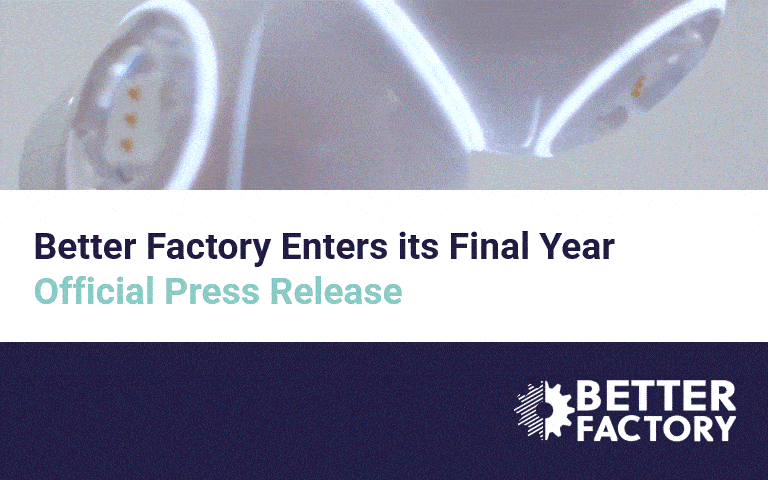- Better Factory aims to help manufacturing SMEs to become more competitive globally, by using art and technology expertise to create new and personalised products
- The 16-month programme boosts each team (consisting of a manufacturing SME, an artist and a technology provider) with up to EUR 200,000 funding and technical support
- In its fourth and final year, the promising results include solutions such as new 3D printing methods and pioneering durable materials.
As the Better Factory project enters its fourth and final year, it marks a significant milestone in this journey which began in October 2020. Over the past three years, 16 dynamic teams, each comprising a manufacturing SME, an artist, and a technology provider, have passed through the transformative Better Factory programme – yielding some pioneering art-driven solutions for the manufacturing industry.
About Better Factory
Better Factory, funded under the European Commission H2020 programme, empowers European manufacturing SMEs to enhance their global competitiveness by harnessing the combined expertise of artists and technology providers. Through generous funding of up to €200,000, teams embark on a 16-month journey to innovate and refine their processes, supported by the project’s 28 expert partners who are located all over Europe.
Throughout the programme, the participating conventional factories have been transformed into lean-agile production facilities, capable of manufacturing new and personalised products along with existing ones. Some examples include: IoT corks and sustainable wine production, a new circular material for young tree growth, a smart digitised envelope, zero waste metal production, eco-friendly diving fins, sustainable durable drinking straws, among others (find out more about the 16 Better Factory teams here).
Current Milestones
The project is yielding promising results from the first round of seven Knowledge Transfer Experiments (KTE) teams. Simultaneously, the second round of nine teams is utilising invaluable insights gleaned from the initial round to craft their innovative solutions.
Concrete Outcomes
Each team has made significant strides in their respective manufacturing domains, yielding promising results. Among these remarkable achievements, we spotlight three transformative technologies from the first round of experiments, while the second round of experiments are still underway:
- LOOP (from the team OCD 3D)
LOOP, an algorithmic marvel, enables the creation of large-scale 3D printed objects reminiscent of crochet or willow weaving. This breakthrough breathes new life into traditional crafts, expanding the horizons of 3D printing. Notable benefits include the utilization of 3rd life waste, a 50% reduction in printing time, and minimised material consumption. LOOP is currently employed by SME The New Raw in crafting a diverse array of artistic vessels and benches.
- FoundObjects (from the team Better CNC Factory)
FoundObjects is an open-source Grasshopper tool that ingeniously repurposes leftover sheet material from CNC projects. This innovation significantly reduces material waste and CO2 emissions, necessitating fewer sheets for equivalent output, thus boosting productivity. The versatile tool finds application in a wide range of manufacturing processes.
- FOLD Printing (from artist Isaac Monté in collaboration with the FOLD team)
FOLD Printing leverages calcium carbonate, abundant in stones and shells, to create a durable yet lightweight printing material. This renewable and fully recyclable solution not only conserves energy but also produces zero waste. It holds immense potential in local recycling loops utilising waste materials like eggshells and marine shells.
APPS and RAMP
In addition to the 16 teams innovating within Better Factory, the project has produced two pioneering tools for manufacturing SMEs to utilise: RAMP and APPS. These solutions will continue to be developed into the fourth year of the project, with updates to be published on the Better Factory website.
The Robotics and Automation MarketPlace (RAMP) brings together data insights, ready-made software and tools and a community of manufacturers and service providers in a true one-stop shop, built to accelerate European SMEs in manufacturing and robotics.
APPS, which is short for Advanced Production Planning and Scheduling, are combination of software services and hardware infrastructure that integrate technologies like 3D printing and Additive Manufacturing to create materials more efficiently, reducing energy consumption, costs, and waste.
Towards the Future
In the final months of the Better Factory project, a comprehensive catalogue featuring all 16 Knowledge Transfer Experiments and their innovative outputs will be made available for download. Additionally, a guide detailing how regions and networks can adopt ‘The Better Factory Method’ will be provided, facilitating collaborative ventures between artists, SMEs, and technology providers for transformative results.
In the meantime, follow Better Factory on Twitter and LinkedIn, watch the newest video, and sign up to the LinkedIn newsletter.
—
Contact information:
For more information on the story, interview requests, or visual materials, please contact:
Charlotte Tucker
EU Communications
Mobile World Capital (Spain)
[email protected]

